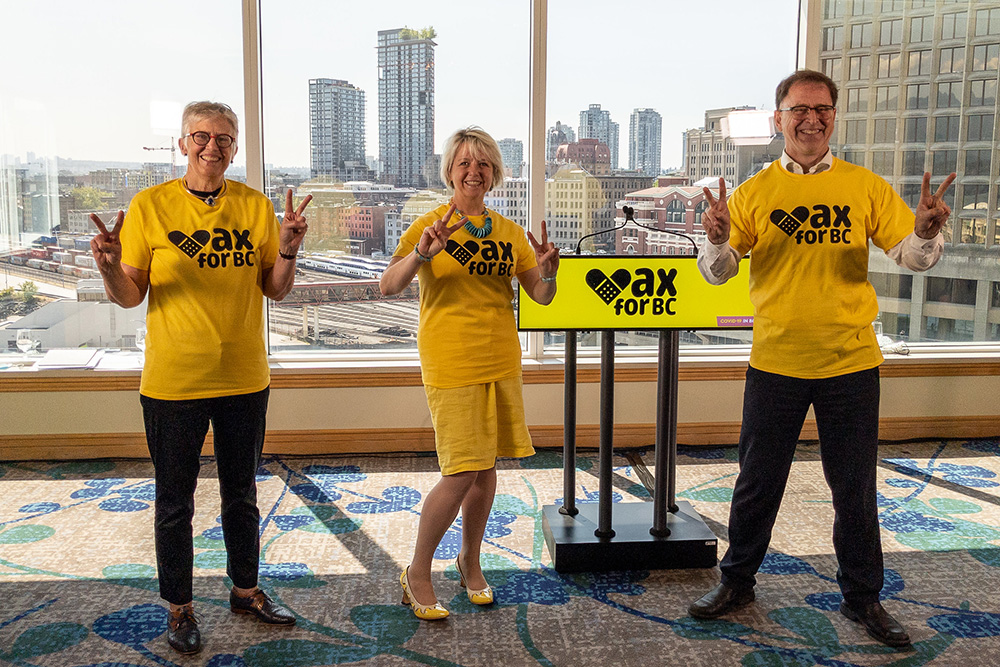British Columbia’s vaccination strategy is changing course to target the more than 900,000 eligible people who are not yet immunized against COVID-19.
The Vax For BC campaign will see mass vaccination clinics scale down to make way for smaller community-based clinics, drop-in centres and mobile vaccination clinics to meet people where they are.
The interval between shots will drop from eight weeks to seven, and as low as six in regions with particularly low vaccination rates.
And the province will make 20,000 shots available without appointments on “Walk-in Wednesday,” Aug. 4, in addition to freeing up more shots at every location for walk-ins.
“We are making it even easier for people to get vaccinated to protect themselves and their loved ones against COVID-19,” said provincial health officer Dr. Bonnie Henry on Tuesday.
More than 80 per cent of people over 12 in B.C. have received at least one dose of a COVID-19 vaccine, an effort that public health officials said should be commended.
But the missing 19.6 per cent, “those 900,000 are really, really important” to prevent a fourth wave of the virus in B.C., Dr. Penny Ballem said today.
“We’ve had incredible success and commitment by the public,” said Ballem, who is in charge of the vaccine rollout. “But we have to keep going, and we have to capture more people.”
Unvaccinated people accounted for about 78 per cent of COVID-19 cases between June 15 and July 15, despite representing only 19.6 per cent of the population.
Those who had a single dose accounted for 18 per cent of cases. And fewer than five per cent of cases involved people who were fully vaccinated.
Overall, vaccinations are preventing about 70 per cent of potential infections, according to recent provincial modelling.
“It is extremely important to get both doses of the vaccine,” said Henry.
The recent slow increase in daily and active cases is still largely driven by social gatherings and events with unvaccinated people, Henry said, most of which are in the Interior.
“We don’t yet have enough people with full protection that it can’t spread,” Henry said.
Increasing vaccinations is particularly important in the Northern and Interior Health regions, Henry said, where long travel times from small communities to existing clinics can make it difficult to get vaccinated.
The regional differences are stark. In Northern Health, 32.5 per cent of the eligible population has not received any vaccine, more than double the 14.8 per cent who are unvaccinated in Vancouver Coastal Health.
In Interior Health, where nearly two-thirds of recent cases have been located, 26.2 per cent of the population is unvaccinated.
When asked about how much of that is due to access and how much is due to vaccine hesitancy or anti-vax sentiments, Henry said the province estimates only about five per cent of people are staunchly opposed to COVID-19 vaccines.
The others, hopefully, can be reached by answering their questions about the vaccines and making it as easy as possible to get vaccinated by bringing the shots to them, she said.
“This is the time for us to say, ‘We can answer your questions,’” said Henry.
The province is not currently considering punitive measures, like mandating businesses to require proof of immunization for service, to encourage people to be vaccinated.
But Henry said businesses and events are within their rights to require vaccines for entry or separate vaccinated and unvaccinated customers.
“It is a choice not to get vaccinated, but there are consequences,” said Henry.
Health-care workers who choose not to be vaccinated will be required to mask and present negative COVID-19 tests, she added, and potentially barred from working in certain units.
“I have very limited patience for people in health care who are not vaccinated,” said Henry. “There will be consequences for that decision.”
Henry and Health Minister Adrian Dix noted that with increased vaccination and the province’s low and stable hospitalization rates, it is unlikely B.C. will see more restrictions or the mask mandate reinstated. The U.S. Centers for Disease Control recommended a return to mask mandates today.
“COVID is going to be with us for a while,” said Dix. “The pandemic, we hope, will not.” ![]()
Read more: Coronavirus, BC Politics

















Tyee Commenting Guidelines
Comments that violate guidelines risk being deleted, and violations may result in a temporary or permanent user ban. Maintain the spirit of good conversation to stay in the discussion.
*Please note The Tyee is not a forum for spreading misinformation about COVID-19, denying its existence or minimizing its risk to public health.
Do:
Do not: